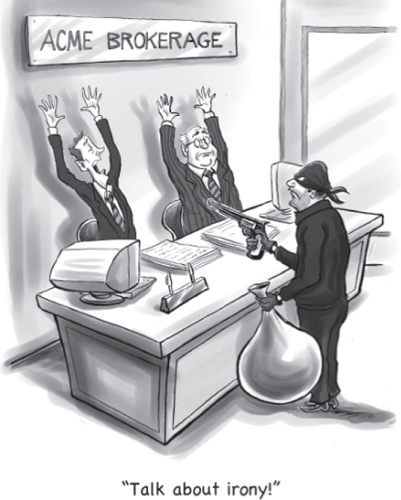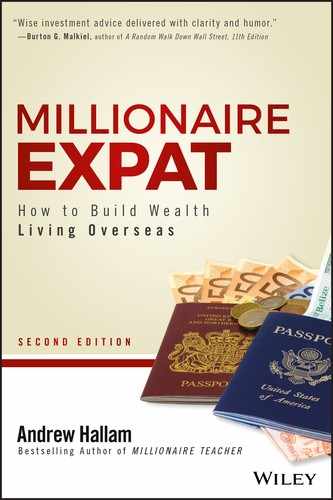Chapter 2
Don't Start a Fight with an Escalator
Admit it. When you were a kid, you were tempted at least once to run up an escalator that was heading down. Sure, it was tougher than taking the stairs, but mastering the mechanical monster was part of the fun.
Unfortunately, most global expatriates trudge against an escalator full‐time with their investments.
I could use any of the world's stock markets to explain this. But in honor of roast beef, Yorkshire pudding, and mushy peas, let's give a nod to the British.
During the decade ending 2013, the typical UK stock earned 132 percent.1
This means £10,000 invested in the average British stock grew to £23,200. Did most British investors make such profits? Not even close. Instead, most financed the lavish lifestyles of those working in the financial services industry.
If every stock on the British market were sold, most of the direct recipients would be pension funds, unit trusts (mutual funds), college endowment funds, and hedge funds. The money would then be paid to investors with stakes in such products. Because the vast majority of the money in the markets is professionally managed, when the UK market earns 132 percent over a given decade, it means the average professional fund earned roughly 132 percent—before fees.
The same premise applies to other countries' stock markets. As a group, because institutional and unit trust money represents the vast majority of assets invested in a given market, the average institutional investor and unit trust will earn (on average, before fees) the market's return. William F. Sharpe explained this in the Financial Analysts Journal in 1991, one year after he won the Nobel Prize in economic sciences.2
It's easy to visualize with a story. Imagine 100 students in a school called Unit Trust. Assume all 100 take an exam, and the school invites four or five kids from outside the district to join them. If the average exam score is 80 percent, the average Unit Trust student would have earned close to 80 percent. The four or five students from outside the district would barely affect the average.
In the same vein, because institutional and unit trust money comprises nearly all of the assets in the British market, the return of the stock index will be close to the average British professional's stock market performance. People like your Uncle Toby and Richard Branson, who might buy their own stocks, have a minor influence on the market because they invest so little money compared to institutional traders. They're like the four or five kids outside the Unit Trust school district whose test scores barely budge the average of the other 100 test‐taking students.
Yes, the Financial District Loves You!
You don't need to be Stephen Hawking to know that those in the British financial district don't work for free. Instead, they're among the highest‐paid people in Britain. Who pays them? British investors, of course. If you invest in a pension or a unit trust, you're paying their salaries.
Most retail investors buy actively managed unit trusts. In North America, they're called actively managed mutual funds. In most cases, they're purchased through an intermediary advisor or broker. The broker then puts the money into a mutual fund. Once there, the cash gets pooled with money from other investors, like your Aunt Lucy, your friend Bob, and the strange homebound bloke with the telescope.
A fund manager then trades stocks within the unit trust. A large brokerage house charges commissions for each trade. But neither the fund manager nor his or her firm is generous enough to pay those commissions. Instead, the costs are skimmed from the mutual fund's proceeds. Can you see where this is headed?
The brokerage firm incurs other costs as well: salaries for employees, research expenses, electricity expenses, advertising expenses, lease expenses, and often a commission for the broker selling the products. Owners of the firm, as well, demand their share of profits. Where does this money come from? It all gets siphoned from the investment assets. Can you hear that escalator whirling?
Recall that the typical British stock earned 132 percent for the decade ending 2013. This means the typical professional investor (in British stocks) earned about the same. But that's before fees.
Add the plethora of costs, and the escalator starts smoking. It's a mathematical certainty that the average retail investor earns nothing close to the return delivered by the average stock, also known as the market average. Whether investors are Canadian, American, European, or Australian, they pay insidious fees to the financial services industry. Such costs jeopardize their futures.
Most of these fees, of course, are hidden from your investment statement. But they're real. And they're punishing. They also draw the ire of many.
Global Investors Getting Fleeced
Warren Buffett says, “Full‐time professionals in other fields, let's say dentists, bring a lot to the layman. But in aggregate, people get nothing for their money from professional money managers.”3 David Swensen, Yale University's endowment fund manager, suggests that the government needs to stop the mutual fund industry's exploitation of individual investors.4

Illustration by Chad Crowe: Printed with permission.
Jack Meyer, the leader of Harvard University's endowment fund, says, “The investment business is a giant scam. It deletes billions of dollars every year in transaction costs and fees.”5
Perhaps you're shaking your head right now. “These blokes are Americans,” you're thinking. “We all know Wall Street gouges the typical Yank.”
Do investors in other countries pay such fees? The answer is no. Most non‐Americans pay much more.
In a study published in 2008 by Oxford University Press, researchers Ajay Khorana, Henri Servaes, and Peter Tufano compared international fund costs, including estimates for sales fees. British investors pay 51 percent more in fees than Americans pay. Canadians pay nearly 100 percent more.6
Understanding the impact of fees is important. If you're paying 2 percent in annual fees each year to have your money managed, you may see this as a paltry sum. But it isn't. If the markets make 6 percent in a given year and you're paying 2 percent in fees, then you're giving away 33 percent of your profits to the financial services industry.
Table 2.1 shows the percentages of annual fees paid by international investors. More important, note the annual profits that investors would lose if their respective stock markets earned 6 percent next year.
Table 2.1 Single‐Year Profits Siphoned by Financial Industry When Markets Earn 6 Percent
SOURCE: Ajay Khorana, Henri Servaes, and Peter Tufano, “Mutual Fund Fees around the World,” Review of Financial Studies 22, no. 3 (2009): 1279–1310. http://faculty.london.edu/hservaes/rfs2009.pdf.
| Country | Total Estimated Expenses, Including Sales Costs | Percentage of Annual Profits Lost by the Investor |
| Netherlands | 0.82% | 13.6% |
| Australia | 1.41% | 23.5% |
| Sweden | 1.51% | 25.1% |
| United States | 1.53% | 25.5% |
| Belgium | 1.76% | 29.3% |
| Denmark | 1.85% | 30.8% |
| France | 1.88% | 31.3% |
| Finland | 1.91% | 31.8% |
| Germany | 1.97% | 32.8% |
| Austria | 2.26% | 37.6% |
| United Kingdom | 2.28% | 38.0% |
| Ireland | 2.40% | 40.0% |
| Norway | 2.43% | 40.5% |
| Italy | 2.44% | 40.6% |
| Luxembourg | 2.63% | 43.8% |
| Spain | 2.70% | 45.0% |
| Canada | 3.0% | 50.0% |
During years when stock markets don't perform well, the industry takes an even bigger chunk of your profits. Assume the German stock market earns 3 percent in a given year. The typical German fund investor pays a 1.97 percent annual fee. In this case, the average mutual fund (unit trust) investor relinquishes 65.6 percent of his or her annual profit.
High fees create a maddening process of two steps forward and one step back. Fortunately, there's an alternative. And by choosing it, global expats give less to the financial services industry and much more to themselves.
In the chapters ahead, I'll show how to bypass a fight with a downward‐heading escalator.
